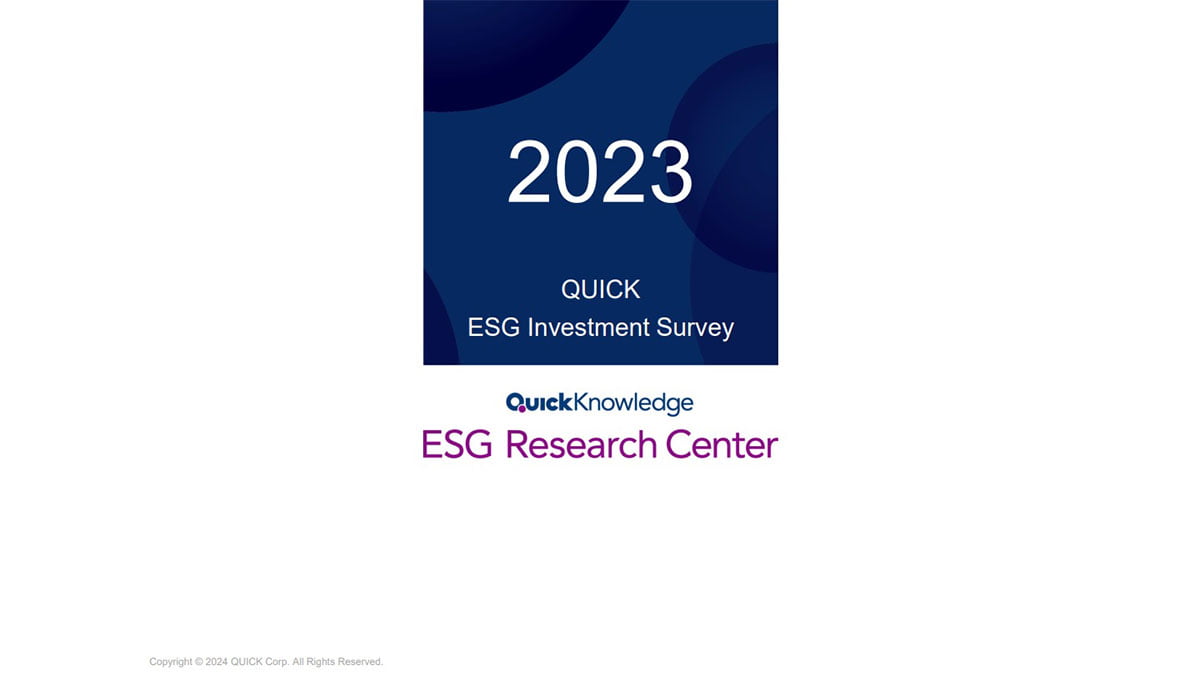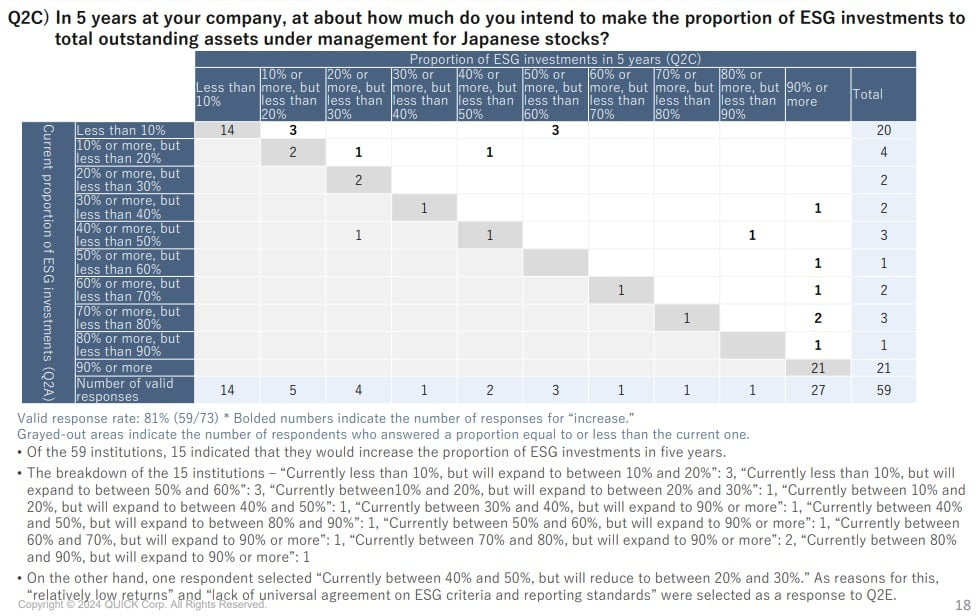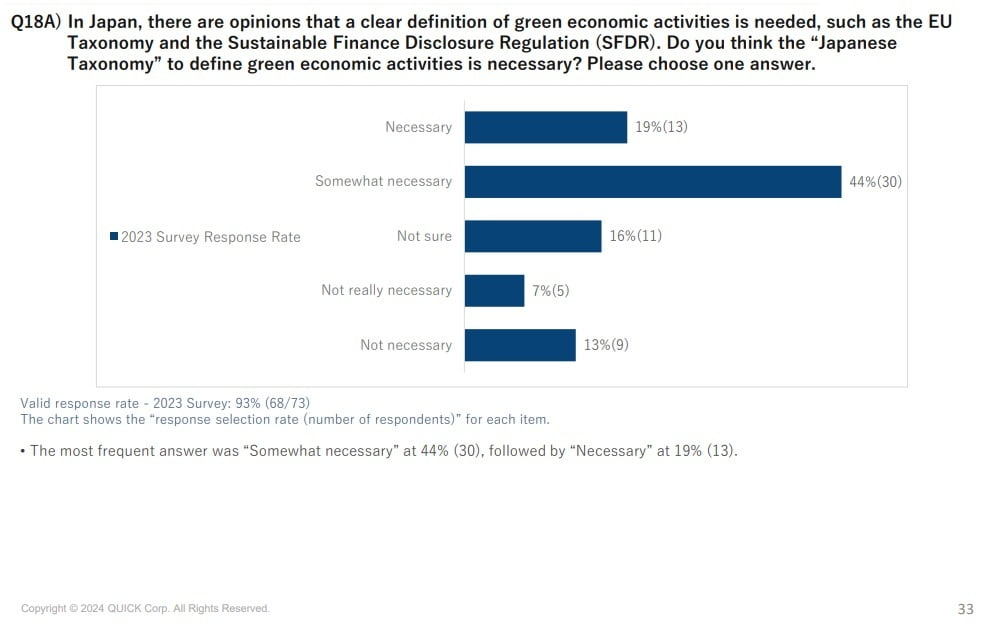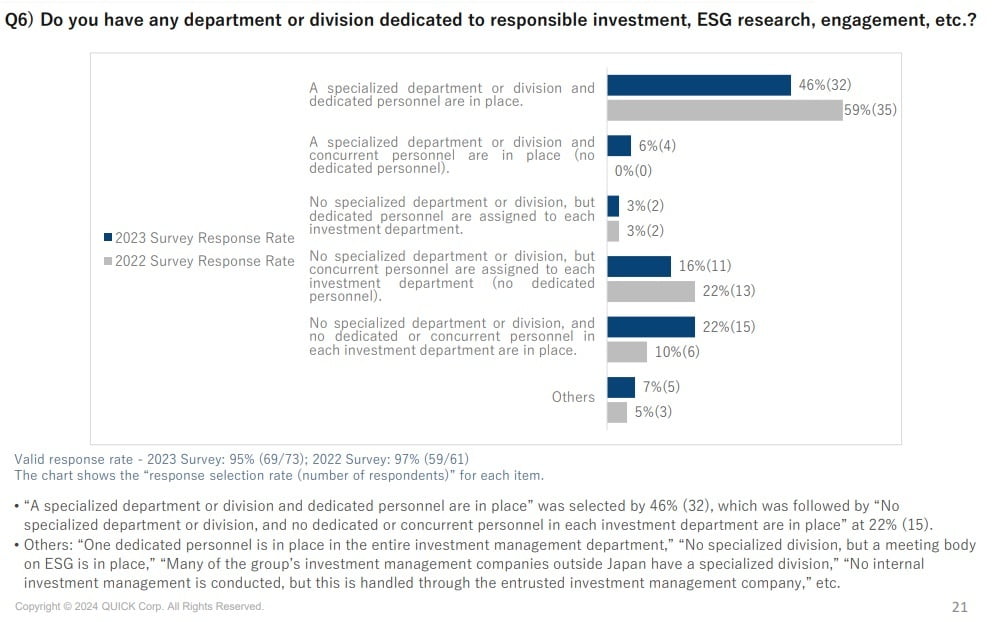- TOP
- Stories
- Returns, Industry Standards, and Human Resources are Challenges to Expanding ESG Investments according to the ESG Investment Survey 2023
- Market Data Approach
- News
Returns, Industry Standards, and Human Resources are Challenges to Expanding ESG Investments according to the ESG Investment Survey 2023

Taigi Endo, QUICK ESG Research Center
The ESG Investment Survey 2023, released by QUICK ESG Research Center on January 30th, revealed three key challenges to expanding ESG investments: returns, ESG standards, and lack of dedicated human resources.
In the 2023 survey--its fifth year--73 out of 265 eligible institutions responded. Although the overall response rate was under 30%, the number of asset holders, including pension funds such as corporate pension plans and mutual aid associations who participated significantly increased from 13 in the previous survey to 27 this time.
Low Returns given as a reason for reducing ESG investments
To a question asking about the ratio of ESG investments to total assets under management in Japanese stocks, one institution responded that it would reduce the ratio in five years. This was the first time since this question was added in 2021 that a respondent indicated an intention to reduce the ratio. One of the reasons given for the reduction was comparatively low returns.

After Russia's invasion of Ukraine on February 24, 2022, stock prices of companies involved in greenhouse gas-intensive energies--which ESG investors tend to avoid--generally rose. To understand the context of why one of our respondent institutions said it intended to scale back its ESG investment ratio, we turned to the Government Pension Investment Fund (GPIF), Japan's largest institutional investor promoting ESG investments.
According to the GPIF annual report for fiscal year 2022, it invests in domestic equities, domestic bonds, foreign equities, and foreign bonds in four equal portfolios, with the balance of domestic equities at 50,333.7 billion yen as of the end of March 2023. Time-weighted rate of return (the rate of return after eliminating the impact of investment principal inflows and outflows) for fiscal year 2022 (ending March 31, 2023) was 5.54%, lower than the benchmark Tokyo Stock Price Index (TOPIX) including dividends, which was 5.81%.
Lack of universal agreement on standards an issue
"Lack of universal agreement on ESG criteria and reporting standards" was another reason given by the institution that intended to scale back its ESG investment ratio. This lack of ESG-related standards is a second challenge to expanding ESG investments. In the 2023 survey, 63% of respondents chose "necessary" or "somewhat necessary" when asked about the need for a Japanese "taxonomy" classifying economic activities that contribute to sustainability from an environmental perspective.

The most common reason given regarding the need for a Japanese taxonomy was "Desirable to have clear standards for information disclosure" (65%), followed by "To prevent "greenwashing" disguised as environmental measures" (60%) and "Desirable to have clear standards for investment decisions" (47%).
In March 2023, the UN PRI (Principles for Responsible Investment) released a report titled "Does Japan Need a Sustainable Finance Taxonomy?" It made policy recommendations based on the survey results. According to the survey, 58% of respondents agreed that Japan should develop a sustainable finance taxonomy.
In May 2021, the Japanese Financial Services Agency, the Ministry of Economy, Trade and Industry (METI), and the Ministry of the Environment released a series of basic guidelines on climate transition finance. In addition, METI has developed a roadmap for promoting transition finance for each industry sector. Nevertheless, a certain number of investors still cite a need to have clear standards.
22% said they have no specialized department, division, or personnel for ESG
In the 2023 Survey, a majority of respondents (58%) said that having analysts present in dialogue was a way to encourage target companies to respond in engagement activities. In response to a similar question in the 2022 survey, 38% mentioned having sector analysts present dialogue. This is an increase of 20 percentage points over the simple comparison. So reliance on analysts seems to be increasing. Thus, a need for dedicated personnel emerges as a third challenge in increasing ESG investments. ESG covers a wide range of environmental, social, and governance issues. Being able to access dedicated personnel is becoming increasingly important for institutions conducting their own engagement.

At the same time, 22% of respondents said they had "No specialized department or division, and no dedicated or concurrent personnel in each investment department are in place." Moreover, the percentage of respondents who selected "A specialized department or division and dedicated personnel are in place" was 46%, a decrease of 13 percentage points from the 2022 survey. This raises some concern, even if it may partly be because some asset owners are making more use of outsourced asset managers.
According to "The Future of Jobs Report 2023" released by the World Economic Forum in May 2023, sustainability specialists ranked second only to AI and machine learning specialists among the fastest-growing job categories. The investment industry is not alone in needing specialists in the transition to an environmentally conscious and sustainable society, but it seems clear that recruiting, nurturing and effectively deploying human resources will be vital to the expansion of ESG investments.
[Outline of Survey]
QUICK ESG Investment Survey 2023
- ● Survey target: 265 Japan-based institutional investors selected from companies that have adopted the Japanese Stewardship Code or are signatories to the Principles for Responsible Investment (PRI)
- ● Number of respondents: 73 institutions (46 asset managers and 27 asset owners)
- ● Survey period: August 21 - October 10, 2023
Click here for the ESG Investment Survey 2023
QUICK

Since its founding in 1971, QUICK has become Japan's largest financial information vendor, and has developed an information infrastructure that supports Japan's securities and financial markets. It delivers high-value global market information from a fair and impartial perspective to a wide range of customers including securities firms, banks, institutional investors and corporations.
See More
